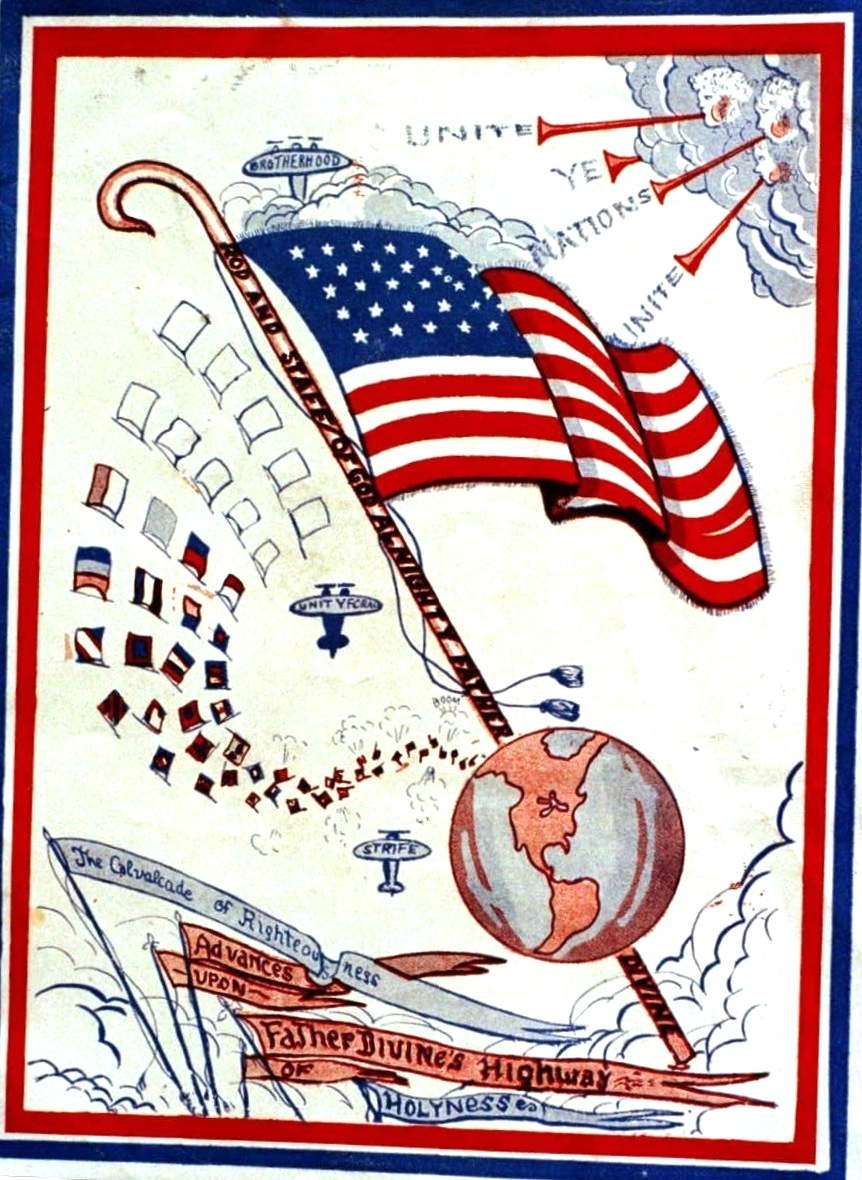Righteousness, Justice and Truth, Marching On

Editor's note: This is reproduced here with the August 5, 1953 Message as evidence of the results of FATHER DIVINE'S Will and the Power of HIS Thoughts.
Only when the histories of the modern battle for equal rights are written may the address delivered by President Johnson to a joint session of Congress last night receive adequate recognition and reverence.
For then it will be clear, as we can only begin to discern now, that this eloquent passionate call for justice marked a fateful turning point in our national existence.
It will be seen as the moment when the grim debate ended and the great decision was proclaimed — when the federal government and Congress declared total war against those who have so long violated the rights and thwarted the dreams of "Afro Americans."
No such sweeping, unequivocal commitment to the cause of "Afro American" rights has been uttered by a Chief Executive in the 102 years that have elapsed since the Emancipation Proclamation.
Nor was this a cry in the wilderness, or a token gesture. It was spoken in the tones of a man confidently leading the forces of freedom into a new, climatic stage of their struggle. It was President Lyndon B. Johnson, not Martin Luther King, who last night pronounced — to Congress and the country — the phrase that has become the slogan of embattled people in so many cities and hamlets: "We shall overcome!"
The drama of the setting has rarely been excelled. Too often in the past such joint sessions have been occasions for somber announcements of national emergencies produced by conflict with foreign adversaries. Mr. Johnson choose to use such a forum to herald his confrontation with the brigades of bigotry and prejudice abroad and in our own land.
"I speak for the dignity of man and the destiny of democracy." he said , in a time when "history and fate" have met as a result of the recent tragedy in Selma, Alabama. His ensuing words were worthy of that preface.
The ostensible reason for his appearance was the imminent presentation of a bill to secure for "Afro Americans" the right to vote so long denied to so many of them in so many places. Mr. Johnson spelled out the basic provisions of the measure — Provisions that will apply to federal, state and local elections alike. He conceded that there might be some differences over the details of the projected legislation. But he made it plain that there would be no retreat on fundamental principles and he insisted, calmly but firmly, there must be "no delay, no hesitation, no compromise with our purpose."
The nation has long heard the "cries of pain and the hymns of protest." Now he summoned all the resources and majesty of a free nation "to right wrong, to do justice, to serve man." Beyond the immediacy of the voting-rights conflict he renewed his plea for a better day for all the have-not's of this affluent nation who are doomed from birth to second-class living.
Mr. Johnson affirmed his vision of a nation — and a world — in which the fires of hate would be quenched and the drums of discord stilled. But what distinguished his address from so much political oratory of the day was his willingness to identify those primarily responsible for domestic strife — those who have compelled "long suffering men and women" to protest the denial of their rights and to engage in a peaceful quest for liberty. His tribute to the "heroism" of "Afro Americans" who have risked their lives in the front lines of this conflict was unqualified; without their valor and their "faith in democracy" the progress already won could not have been achieved and the basis for future advance laid.
To those obsessed with military maneuvers abroad who would seek a domestic "truce" at home, his answer was clear; no matter what our victories on earth or our conquests in space, "we shall have failed as a nation" if the battle for American justice is lost.
Most of Mr. Johnson's speech was addressed to the die-hard racists and their allies who cling to a dying past. But its impact should not be lost on those scattered, isolated demagogueries in and around the civil rights movement who prefer to preach that all is futile within the democratic framework and who have scorned the labors of Dr. King, Roy Wilkins, James Farmer and others who refused to abandon all hope. There will be those who justly say that some lives would have been spared if these words had come sooner; but at least there is new assurance that the martyrs did not die in vain. There must also be a new awareness of the resources and resiliency of a democracy which produces a president from Texas who chooses to lead this struggle.
We have not seen the end of the ordeal; but surely we have seen the end of the beginning, and a glimpse of real daylight. In the bi-partisan Congressional cheers and applause that so often greeted the President's most challenging and forthright words last night, there was the sound of a new America. Like most Presidents, Mr. Johnson, will have bleak days as well as peaks. But few Americans will dispute the over-all magnificence of these moments, and of what they portend.